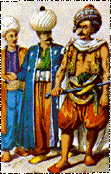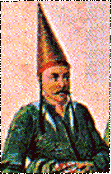| |

|
|

 |
4
OF 5 |
 |
 |
| |
With a military force and a bureaucracy thus
recruited from the non-Turkish and non-Moslem subjects, the earlier
Ottoman sultans secured effective control over the empire. This
they were able to maintain until the forces of corruption inherent
in a military state based essentially on exploitation undermined
the integrity of the Ruling Institution and changed basically the
structure of the Janissary organization.
The Janissaries were closely associated with the religious order
of the Bektash Dervishes, whose agha, or chief, held a commission
as colonel in the Janissary organization. Dervishes were attached
to all the military units of the Janissaries in their barracks and
to the troops in the field. Thus the Janissaries closely affiliated
with the Moslem Institution of ulemas, muftis, and cadis acquired
elements of political power which threatened that of the sultans.
Growing weakness of the sultans in the seventeenth century resulted
in the granting of more privileges to the Janissaries, whose officers
became a class exempted from the burdens of taxation which even
the Moslem population bore. Although Janissaries held a very special
position in the empire and their officers had many opportunities
to enrich themselves, the rank and file frequently found themselves
without pay when the government was in financial difficulties.
 |
| Officer |
Gradually, the very structure of Janissary organization
was changed. Because of the opportunities open to the officers,
many Turks sought to have their children enrolled in the Janissary
corps, and by the last quarter of the seventeenth century the Janissaries
ceased to be recruited from Christian families. Meanwhile, many
ill-paid Janissary privates engaged in crafts and commercial activities,
becoming prominent in so-called "corporations," which
were comparable to the craft and merchant guilds of medieval Europe.
This military organization holding a specially privileged position
closely allied with a powerful religious brotherhood, eventually
became intimately associated with important economic organizations.
It thus grew to be a potent instrument of political power. The Janissaries,
by riots, and mutinies, forced the sultans to dismiss members of
the Divan and grand viziers, and even deposed sultans. While it
was frequently described by historians as a Praetorian Guard, the
Janissary corps, through its affiliations with other Ottoman institutions,
had wider alliances than any mere body of mercenary troops.
The growing corruption of the Janissary corps undermined the military
power of the Ottoman Empire and exposed it to foreign invasion.
It threatened the very existence of orderly government. Not until
1826 was its power broken and the Ottoman state freed from this
dangerous incubus. It was only when the ulemas and the members of
the Ruling Institution had come to understand its threat to the
very existence of the state that Sultan Mahmoud II was able to obtain
their consent to the destruction of the Janissary corps.
 |
4
OF 5 |
 |
|
|


